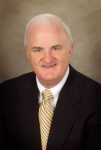Project 17 winner of national grant

TOPEKA -- Project 17, a regional initiative spearheaded by four Southeast Kansas senators to help revitalize the region, has won a Rural Jobs and Innovation Accelerator Challenge grant.
Winners of the grant, meant to spur job creation and economic growth in rural areas nationwide, were announced Wednesday. Sen. Bob Marshall, R-Fort Scott, one of four state Senators who spearheaded Project 17, said the funds could be used finance an executive director and assistant to keep the effort going. One of the things he has pushed for as well is a business survey of the region so firms would know what items are available locally without having to buy or hire out of the area and state.
"It just further enhances the ability of Project 17 and gives us more viability and credibility," Marshall said.

"We are getting recognized because of what Project 17 is doing. We're getting out there and being part of (improving) ... the economic climate," added Fort Scott City Manager Dave Martin, who is involved in the venture.
The Advance Manufacturing Institute at Kansas State University partnered with Project 17, and was one of 13 national awardees to receive a Rural Jobs and Innovation Accelerator Challenge grant. Project 17 will receive a $715,000 grant to help revitalize the manufacturing industry in Southeast Kansas to promote economic opportunities.
The Rural Jobs Accelerator Challenge is a national initiative to bolster rural partnerships that are critical to support small businesses. By leveraging local assets, selected industry clusters and partnerships can do even more to help entrepreneurs and small businesses foster innovation, increase competitiveness and employ highly skilled workers, all of which are critical to long-term economic growth in their regions, a news release said.
Project 17 will receive a $215,000 grant from USDA Rural Development and $500,000 from the Economic Development Administration to help promote job creation, accelerate innovation and provide assistance to entrepreneurs and businesses in advanced manufacturing.
"USDA Rural Development is pleased to provide financial support, in concert with EDA, to this locally-led, regional planning effort. The state and local support help capture the federal funds to finance this multi-county, multi-community collaboration," USDA Rural Development State Director Patty Clark said in the release. "Regional planning will help create more opportunities for the skilled workforce, a higher quality of life for residents and a brighter future for the individuals and families that choose to call Southeast Kansas home."
The three-year project will create a shared regional vision and an asset-based development approach to spur job and wealth creation through the development of the Southeast Kansas Opportunity Innovation Network. The network will assist with mapping regional assets, profiling the innovation capabilities of businesses and connecting businesses with innovation resources, the release said.
"Through comments from 300 Southeast Kansans, Project 17 has identified four areas that need to be addressed: economic development, health care, leadership and permanent structure," Yvonne Hull, executive director of the Coffeyville Area Chamber of Commerce, said in the release. "This grant will provide Project 17 with the resources necessary to open up growth opportunities for businesses in Southeast Kansas."
Seventeen Southeast Kansas Counties will be served: Allen, Anderson, Bourbon, Chautauqua, Cherokee, Coffey, Crawford, Elk, Franklin, Greenwood, Labette, Linn, Miami, Montgomery, Neosho, Wilson and Woodson.
The project objective is to create and sustain well-paid jobs in identified industry clusters in the Southeast Kansas region by leveraging experience and methods of recognized regional development experts and engaging economic and community leaders from across the region.
Along with Marshall, the senators who started Project 17 are Pat Apple, R-Louisburg, Jeff King, R-Independence, and Dwayne Umbarger. R-Thayer. Apple has been redistricted out of his district and King and Umbarger are running against each other, Marshall said.
The competition, funded by the U.S. Department of Commerce's Economic Development Administration, U.S. Department of Agriculture, Appalachian Regional Commission and Delta Regional Authority, was designed by the Taskforce for the Advancement of Regional Innovation Clusters and the White House Rural Council.
The initiative is also supported by nine other federal agencies: Commerce's U.S. Patent and Trademark Office and National Institute of Standards and Technology Manufacturing Extension Partnership; Denali Commission; U.S. Department of Education; U.S. Department of Labor's Employment and Training Administration; U.S. Department of Energy; Environmental Protection Agency; U.S. Department of Housing and Urban Development; and the Small Business Administration.
Before being awarded the challenge grant, Marshall said Project 17 received a $1 million in-kind grant which would allow officials to choose 400 people from the region to attend training with the Kansas Leadership Center. "Hopefully, those will be young people" who can help fight the Southeast Kansas economic doldrums, Marshall said.
